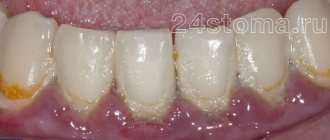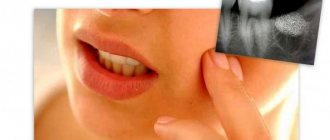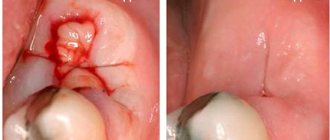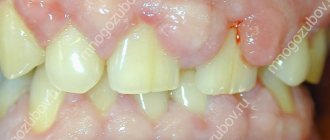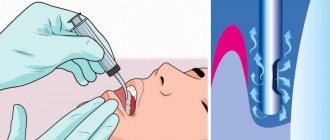Inflammation of tissues and accumulation of pus in any part of the body causes a person many problems - from constant pain and fever to the risk of infection spreading throughout the body. Particular discomfort occurs when the gums become inflamed, since an abscess in the mouth interferes with normal eating and talking. Treatment of diseases accompanied by the release of pus from the gums near the tooth should be carried out under the supervision of a dentist, but therapy can also be supplemented with traditional medicine methods.
What to do if your gums become rotten? Treatment options depending on the cause and stage of inflammation
As practice shows, most often patients seek dental care when they simply cannot bear the pain. At this stage, doctors have to deal with advanced forms of pathological processes. If we are talking about gum inflammation, then the lack of timely treatment will sooner or later lead to chronicity of the disease or the addition of purulent processes. For more information about what causes purulent inflammation of the gums and what to do in such a situation, how to treat the disease, read further in the article.
Causes of pus discharge from the gums
The oral mucosa is a delicate environment, susceptible to attack by a huge number of different infectious pathogens. Even minor damage to its integrity provides unimpeded access for many pathogenic microorganisms, which can easily lead to tissue inflammation and the onset of purulent processes. But mechanical injuries are not the only factor that can provoke the formation of purulent masses in the thickness of the mucosa. There are other reasons too. Here's why your gums can still fester:
- gum and periodontal diseases, including gingivitis, periodontitis and periodontitis,
- thermal and chemical burns,
- abundant periodontal deposits or their inaccurate removal,
- deep caries and its complications, including pulpitis, periostitis,
- medical errors made during canal treatment,
- violation of the principles of asepsis and antisepsis during dental treatment,
- non-compliance with doctor’s recommendations after tooth extraction and other medical procedures,
- bruxism, leading to abrasion of enamel and injury to the gums,
- decreased immune system,
- serious diseases of internal organs, including disorders of the endocrine system and diabetes, etc.
The cause of pus can be inflammation and stone on the teeth
. Note! In fact, the main reason that provokes inflammation of the oral mucosa is the active activity of pathogenic microorganisms. But such activity can easily be provoked by one or several of the above factors.
With a healthy, stable microflora, the likelihood of pus appearing even if the mucous membrane is injured remains at a minimal level. However, against the background of insufficient hygiene or systemic disorders in the body, even a small scratch can initiate a serious pathological process. In such a situation, the affected area usually becomes red and swollen, and there is severe pain, especially when pressed. These are alarming symptoms, which, of course, should be a good reason to urgently consult a doctor.
Etiology of the problem
The presence of pus under the tooth in the gum is not the cause, but a consequence of the development of periodontal inflammation.
Experts include the following as the main reasons for the formation of inflammation:
- Poor or insufficient oral hygiene.
- Injury to soft periodontal tissues.
- Poor quality prosthetics.
- Past dental and otolaryngological diseases of infectious etiology.
- Entry of pyogenic bacteria into periodontal pockets.
- Exposure of the gums to aggressive chemicals.
Important! Suppuration and bleeding of the gums, the presence of an unpleasant odor, the formation of tartar and pockets, discoloration of the gums, itching and throbbing pain indicate the development of periodontal abscess.
Symptoms that indicate the appearance of pus
If the swollen gums are inflamed and painful, this is a clear sign of a serious pathological process - you need to urgently see a dentist and begin appropriate treatment. The onset of purulent processes is indicated by the following symptoms:
- redness of soft tissues within the lesion,
- swelling of the gums, which can rise above the periodontium by 2-3 mm,
- the presence of a deep carious cavity in the causative tooth,
- the presence of abundant pigmented plaque and hardened deposits rising above the gum level,
- the appearance of an unpleasant odor - halitosis,
- severe piercing pain with throbbing.
Symptoms of the problem may be swelling and redness of the gums.
With this clinical picture, many patients also have enlarged and painful lymph nodes, and an increase in body temperature. In the advanced stage, the cheek becomes very swollen, which leads to deformation of the oval of the face. In some cases, when you try to press on the swelling, pus may come out from under the gum.
Symptoms of purulent inflammation in the mouth
A periodontal abscess is similar to the pathogenesis of a boil or boil. The first symptoms of the pathology are expressed in red infiltration and swelling of surrounding tissues. Pain occurs when pressing on the site of infection. After some time, a white ball appears, containing pus inside. The person’s well-being deteriorates, signs of a cold are observed: hemicrania, general fatigue, chills.
Photo: this is what a gum with an abscess looks like
Pus on the gum appears above the tooth or between the tooth and gum, depending on the location of the infection. Further formation of an abscess can be recognized by the following signs:
- unpleasant taste and odor from the mouth;
- speech function disorder;
- feeling of discomfort during chewing and swallowing;
- blue discoloration of tooth enamel.
What treatment can be offered in dentistry?
If your gums near a tooth are festering, consult a doctor immediately. Do not try to solve the problem yourself, because such arrogance can lead to the development of even more severe and dangerous complications. After a visual examination and palpation, a specialist can refer you for x-ray diagnostics if necessary. After making an accurate diagnosis, the doctor will choose the optimal treatment tactics.
Surgical removal of purulent exudate
In advanced cases, the only option to solve the problem is surgical intervention. But first you must remove plaque and deposits. Next, under local anesthesia, the doctor opens the pathological focus and, if necessary, installs a drainage for the outflow of purulent masses. Then, after some time, you will need to visit a specialist again to remove the drainage system and apply sutures. After this, the doctor will prescribe appropriate medications for home therapy.
The photo shows an operation to remove pus
During rehabilitation, the patient must take prescribed anti-inflammatory drugs, including antibacterial rinses. If the gum is swollen near the tooth, and it is severely destroyed and there is serious damage to the root, it will have to be removed. In this case, the purulent abscess will be eliminated after extraction. It is also worth noting that in almost 60% of cases, such a picture is characteristic of problematic eruption of a wisdom tooth, and this is a strong indication for its removal1.
Drug therapy
If the pathological process is at a very early stage, it can be stopped without resorting to surgical intervention. But drug therapy is also prescribed after surgery. Thus, to remove pus and speed up tissue healing, experts in the field of periodontology prescribe the following drugs to patients:
- antiseptic solutions with anti-inflammatory effects, for example, Chlorhexidine,
- antibacterial and wound-healing gels and ointments - “Metrogil denta” or “Cholisal”,
- solutions for performing oral baths – “Stomatofit”, “Rotokan”,
- antibiotics to destroy pathogenic microflora - “Flemoxin Solutab”, “Ciprofloxacin” (only as prescribed by a doctor),
- painkillers – “Nurofen”, “Ketanov”,
- multivitamin complexes to strengthen the immune system - “Vitrum”, “Complivit”.
At an early stage of the disease, you can use ointments.
Almost each of the above drugs has its own nuances of use and contraindications.
Therefore, you should undergo such therapy only according to a doctor’s indications.
What can you do at home?
Maintenance therapy at home is allowed only after consultation with a dentist. Not all traditional medicine recommended for inflammation are also allowed for purulent processes - this must be taken into account. For example, you can rinse your mouth with a soda-salt solution to relieve acute inflammation and reduce pain. Chamomile and sage infusions have also worked well in this regard. It is important that the liquid is at room temperature, never hot or cold.
Herbal decoctions can be used at home
Characteristics of a blood bubble on the oral mucosa
The mucous membrane protects the entire body from the negative influence of the environment, from harmful microorganisms, various types of pollution, and also has a fairly high level of regeneration.
If blood blisters regularly appear on the oral mucosa, then you should take this signal seriously and take action. A bloody ball in the mouth is a hematoma (bruise), which is characterized by the accumulation of blood in a certain place in the oral cavity. The appearance of bloody blisters is a kind of hemorrhage that occurs due to trauma to the capillaries and thin vessels of the mucous membrane.
A blister on the mucous membrane may contain clear serous fluid without the presence of blood. This means that the vessels were not damaged and the resulting wound is superficial. Such blisters on the mucous membrane heal much faster. The presence of blood in the bladder indicates a deep injury and a longer period of healing and blood resorption.
How can you “pull out” pus from the gums?
Remember that you should never try to burst an abscess on your own - this is fraught with life-threatening consequences, including blood poisoning and death. However, there are several proven folk recipes that can slow down the development of purulent processes in the early stages. They can be used in practice only after consulting a doctor.
Juice from mashed potatoes
Potatoes contain starch, which has a pronounced anti-inflammatory and enveloping effect. To prepare a compress, you need to grate one young potato on a medium grater, wrap it in gauze and squeeze out the juice. After this, dip a cotton pad in it and apply it to the inflamed area for 15-20 minutes. 2-3 repetitions a day are enough for relief to occur.
The juice of grated potatoes can alleviate the problem.
Chamomile infusion with added sea salt
First, you should prepare a chamomile decoction: pour boiling water over a teaspoon of dried flowers, let it brew and strain. After this, you need to mix a teaspoon of broth and salt. Wrap the resulting substance in gauze and apply to the sore spot for half an hour. Then you should rinse your mouth with a small amount of pure chamomile infusion. You can make such compresses up to 3-4 times a day.
Cyclamen juice
This plant was popularly used to treat sinusitis, including sinusitis. However, cyclamen juice also helps reduce the intensity of purulent processes in the oral cavity. The healing liquid is extracted from the tubers, but before use it must be diluted with water in a 1:1 ratio. After this, a cotton pad should be moistened in the resulting substance and applied to the inflamed area for 15 minutes. The procedure can be repeated up to 2 times a day. The main thing is to make sure that you do not have allergies. If discomfort or itching occurs, you should immediately remove the compress and rinse your mouth.
The mechanism of formation of a blood bubble on the oral mucosa
Bloody blisters in the mouth in most cases are not life-threatening.
They are formed as a result of mechanical damage to the mucous membrane. When microtrauma occurs, harmful microorganisms attack the damaged area. Read also: What is a gum former during implantation
After this, a number of responses are activated in the human body:
- The immune system is activated. Monocytes and leukocytes, as well as macrophages, instantly arrive at the damaged area, attacking the harmful pathogen and quickly destroying it.
- Immune cells die. This is a signal for other cells and substances are released in the affected area that are mediators of inflammation of the mucous membrane - serotonin, histamine and bradykinin.
- These substances cause a strong spasm of the circulatory system and the outflow of blood is hampered. After the spasm is relieved, all accumulated blood immediately flows to the site of inflammation. It moves at high speed and under pressure. A detachment of the mucous membrane occurs in the mouth, and a bloody blister appears.
Suppuration in a child
If a child has an inflamed gum near a tooth and there are all signs of the onset of purulent processes, there is no need to hesitate - see a doctor immediately. Keep in mind that children have weaker immunity than adults, so any disease progresses rapidly. To avoid serious complications, you need to act quickly.
If a problem occurs in a child, you should immediately consult a doctor
Important! If we are talking about baby teeth, pus can damage the buds of permanent incisors and molars. This will inevitably affect their health in the future, and also risks leading to improper formation of the entire dental system.
Under no circumstances try to pierce an abscess yourself, even if you have antiseptic agents with you for treatment. To relieve acute symptoms before visiting a pediatric dentist, you can have your child rinse their mouth with a weak soda-salt solution. Of course, we are not talking about very young children who may accidentally swallow liquid.
Bottom line
An abscess on the gums of a child or an adult can appear from the development of caries or mechanical damage to soft tissue. This disease can strike at any age under favorable conditions. An abscess is dangerous due to the presence of infection in the purulent exudate, so medical attention is necessary. Before visiting the dentist, you can reduce pain with safe analgesics and rinsing with herbal decoctions or antiseptics.
Sources used:
- Nikitina T.V. Periodontal disease. - M.: Medicine, 1982.
- KY Zee. Smoking and periodontal disease // Australian Dental Journal. — 2009.
- American Academy of Periodontology (USA)
What complications can there be?
It is important not to delay the visit to a specialist, since purulent processes in an advanced stage lead to serious and dangerous consequences. Here are just some of the possible complications:
- root damage and subsequent need for complete tooth extraction,
- purulent damage to bone structures and the development of osteomyelitis,
- formation of granulomas and cysts,
- spread of infection to other organs,
- blood poisoning - sepsis
Purulent processes in an advanced stage lead to serious and dangerous consequences
“Treat your teeth on time!! Don't delay! I once lost a tooth due to an abscess, and I was only 30 years old. Like many, I put off going to the doctor until the last minute. I rinsed with baking soda and salt for several days. As soon as the pain subsided, I decided that everything was over. Yeah, no matter how it is! As a result, after a while it got so bad that I had to rush to the emergency dentistry. It turned out that it’s not just the nerve that needs to be removed, but the entire tooth! Horror! I still really regret that I realized it so late...”
Alexandra V., from correspondence on the woman.ru forum
It is also equally important, after treatment, to strictly follow all the dentist’s instructions and conscientiously follow all his instructions, including taking prescribed medications. Otherwise, after some time you may experience a relapse.
Possible consequences
A cyst at the root of a tooth is dangerous primarily due to the asymptomatic onset of the disease. And at the first sign of a tumor, most people do not rush to the dental clinic. But such a negligent attitude can lead to serious consequences:
the entry of pus from a ruptured cyst into the periosteum and the development of phlegmon;
the formation of a bag of pus in the periodontal space - gumboil;
Diseases resulting from an untreated cyst cause much more pain and require longer and more complex treatment than the primary disease.
Therefore, if a formation occurs on the gums, it is necessary to visit a doctor as soon as possible.
What can be done for prevention
To reduce the risk of developing purulent processes in the gums, it is necessary to ensure proper prevention of inflammatory diseases. To do this, experts in the field of periodontology suggest adhering to the following recommendations:
- brush your teeth twice a day. If you have problems with your gums, it is better to use a brush with soft bristles or medium hardness - as prescribed by your doctor,
- rinse your mouth after every meal, including using preventive antibacterial and anti-inflammatory solutions for sensitive gums, if such problems exist,
- diversify your diet with a sufficient amount of fresh plant foods, as well as foods rich in fluoride, calcium, phosphorus and other beneficial vitamins and minerals,
- It is advisable to completely stop smoking and drinking alcohol,
- Regularly visit the dentist for preventive examinations and prof. hygiene – removal of plaque and deposits.
Regular oral hygiene will help avoid the problem.
If you notice signs of an inflammatory process, consult a doctor. The sooner you start treatment, the easier and faster it will be. Advanced chronic forms of dental diseases are difficult to treat and often require an integrated approach and frequent visits to the doctor. And remember that only a specialized specialist can offer adequate assistance. Any attempts to solve the problem on your own without prior consultation are fraught with serious complications and consequences.
1According to WHO.

